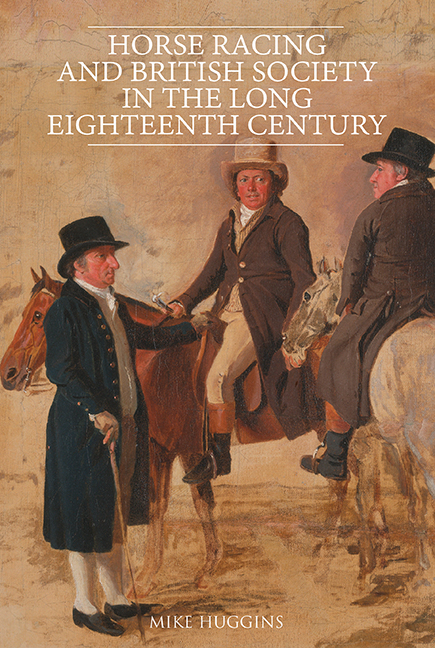Book contents
- Frontmatter
- Contents
- List of Illustrations
- List of Tables
- Acknowledgements
- Further Matter
- Introduction: Setting the Scene
- 1 The ‘Race Week’ in British Social Life
- 2 The Secret World of Wagering
- 3 Horse Racing and British Politics
- 4 Racing and its Rules
- 5 Running the Race Meeting
- 6 The Racehorse, its Ownership and Breeding
- 7 Vital Professionals: Jockeys, Grooms and Trainers
- Conclusion
- Bibliography
- Index
7 - Vital Professionals: Jockeys, Grooms and Trainers
Published online by Cambridge University Press: 28 June 2018
- Frontmatter
- Contents
- List of Illustrations
- List of Tables
- Acknowledgements
- Further Matter
- Introduction: Setting the Scene
- 1 The ‘Race Week’ in British Social Life
- 2 The Secret World of Wagering
- 3 Horse Racing and British Politics
- 4 Racing and its Rules
- 5 Running the Race Meeting
- 6 The Racehorse, its Ownership and Breeding
- 7 Vital Professionals: Jockeys, Grooms and Trainers
- Conclusion
- Bibliography
- Index
Summary
FOR a relatively small group of racing professionals, eighteenth-century horse racing offered good opportunities for competing, training horses, running stables and earning money. Current scholarly studies have concentrated on their role in more recent centuries. So it is important to learn more about their lives and experiences. How were they thought about at the time, what were their lives like, and what was their relationship with owners?
Their historiographic invisibility has largely been created by earlier conventional racing histories produced by or for racing's elite, which privileged top-down views of racing, and largely ignored these working-class riders and grooms. The word ‘groom’ was assumed to apply merely to anyone employed to look after horses. The early modern term ‘jockey’ had also attracted negative connotations. By around 1640 it referred to horse dealers, and to cheating horse dealers and professional horse-race riders by c.1683, vagabonds and beggars by c.1685, and by c.1700 also sometimes meant ‘to trick or gain advantage’. Though by c.1684 the word was also sometimes applied to breeders and racehorse owners, the Racing Calendar did not include jockeys’ names until 1823. Trainers’ details only appeared with the publication of Ruffs’ Guide to the Turf in the 1840s.
Such omissions meant modern historians could easily misinterpret their significance. The ‘absence of regular reference to jockeys’ found in conventional sources was ‘because of their lowly place’. The racing ‘groom’ was dismissed as ‘nothing more than a liveried servant’, a ‘subservient’ riding groom, expecting perhaps ‘a side of bacon or a cheese’ for a win, and lacking any fame. Even Newmarket's National Horse Racing Museum's curator believed that early training grooms were ‘largely unnamed’.
More creative use of sources offers a very different picture. Many of those variously called ‘servants’, ‘grooms’, ‘horse coursers’, ‘jockeys’, ‘feeders’, ‘riders’, ‘horse riders’, ‘horse jockeys’, ‘riding grooms’, ‘feeding and riding grooms’, ‘horse keepers’ or ‘training grooms’ – depending on the perception of their role – were highly professionalized, highly valued and well known across racing society for much of the early modern period. The same man was often simultaneously training and riding groom.
In Bourdieu's terms they occupied a cultural field, one in which much pre-racing activity took place away from direct supervision by employers and external constraints, so they could construct and regulate it secretively, away from public scrutiny.
- Type
- Chapter
- Information
- Horse Racing and British Society in the Long Eighteenth Century , pp. 240 - 277Publisher: Boydell & BrewerPrint publication year: 2018



